#fichte
Text
German and Austrian contemporaries of Napoleon (plus one by Émile Zola in his essay about Stendhal, a French contemporary):
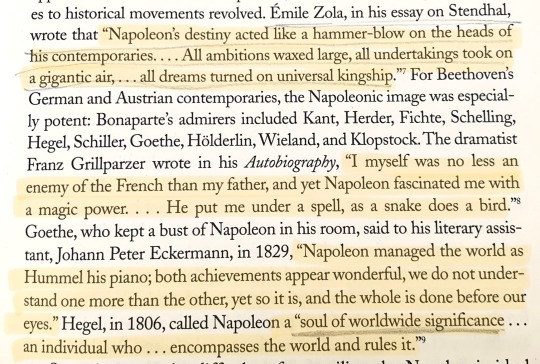
Source: Beethoven, by Maynard Solomon
#napoleon#quotes#book#book pic#napoleonic era#napoleonic#first french empire#french empire#napoleon bonaparte#Kant#herder#Fichte#schelling#Hegel#Schiller#Goethe#friedrich hölderlin#hölderlin#wieland#klopstock#grillparzer#franz grillparzer#émile zola#Zola#Stendhal#Beethoven#france#history#frev#immanuel kant
20 notes
·
View notes
Text
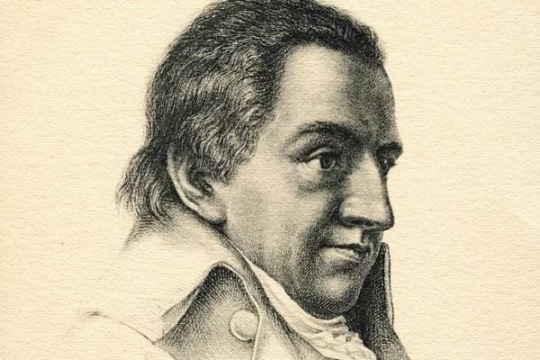
«Y especialmente todos vosotros, que tenéis fuerzas para ello, declarad la guerra más implacable a aquello que es el primer prejuicio del que se siguen todos nuestros males, a aquella que es la fuente ponzoñosa de toda nuestra miseria: al principio según el cual la misión del príncipe es velar por nuestra felicidad. Perseguidlo con el sistema entero de nuestro saber por todos los escondrijos en los que se ha ocultado, hasta que sea exterminado de la tierra y devuelto al infierno que es de donde vino. El principio dice que nosotros no sabemos lo que promueve nuestra felicidad, lo sabe el príncipe y es él quien tiene que guiarnos hasta ella, por eso tenemos que seguir a nuestro guía con los ojos cerrados. El hace con nosotros lo que quiere, y si le preguntamos, nos asegura bajo su palabra que eso es necesario para nuestra felicidad. Pone la soga en torno al cuello de la humanidad y grita: “Calma, calma, es todo por vuestro bien”.
No, príncipe, tú no eres nuestro Dios. De El esperamos la felicidad, de ti la protección de nuestros derechos. Con nosotros, no debes ser bondadoso, debes ser justo.»
Johann Gottlieb Fichte: «Reivindicación de la libertad de pensamiento», en Reivindicación de la libertad de pensamiento y otros escritos políticos.Tecnos, pág. 12. Madrid, 1986.
TGO
@bocadosdefilosofia
@dias-de-la-ira-1
#fichte#johann gottlieb fichte#reivindicación de la libertad de pensamiento#felicidad#bondad#justicia#prejuicio#príncipe#gobierno#estado#manipulación#manipulación política#escritos políticos#teo gómez otero#filosofía contemporánea#idealismo alemán#función del estado#derechos#derecho
3 notes
·
View notes
Text




Hegel, Fichte, Brecht, and Marcuse at Dorotheenstadt cemetery in Berlin.
79 notes
·
View notes
Text
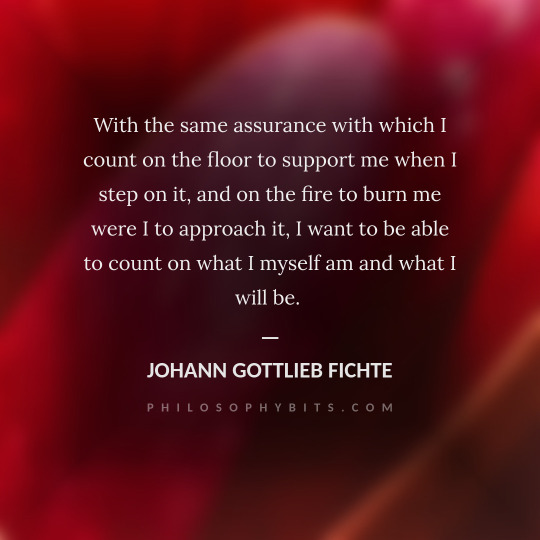
4 notes
·
View notes
Text
Die Lüge ist immer ein Selbstmord des Geistes.
—Johann Gottlieb Fichte
[The lie is always a suicide of the Spirit.]
7 notes
·
View notes
Text
A great afternoon 🌥
33 notes
·
View notes
Text
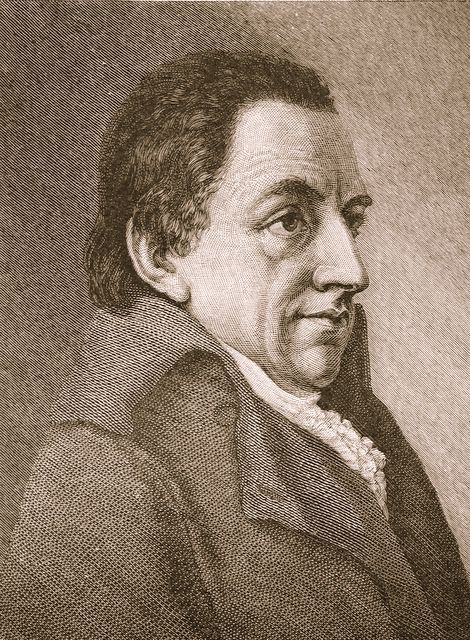
"Man, I'm not really religious... I'm more like... spiritual: one time I was smoking weed and I was like 'Dude maybe God is like... inside of me and it's the friends we made along the way and shit'. "
~ Johann Gottlieb Fichte
2 notes
·
View notes
Text
Thus far 1) both Hegel and Fichte have a son named Immanuel (yes, after Kant) and 2) Hegel requested to be buried next to Fichte. I’m not saying I ship it, but this ship literally screams every love affair needs a third, just like every life needs a Big Other.
#german idealism#Fichte#Hegel#I don’t think they even met#but that means there’s no one sided immediacy no#the most mediated of all ships
3 notes
·
View notes
Quote
Chi non ha il necessario per vivere non deve riconoscere né rispettare la proprietà degli altri: i principi del contratto sociale sono già stati violati a suo sfavore.
( Johann Gottlieb Fichte)
7 notes
·
View notes
Quote
The dispute between the idealist and dogmatist is, in reality, about whether the independence of the thing should be sacrificed to the independence of the self or, conversely, the independence of the self to that of the thing.
Johann Gottlieb Fichte, The Science of Knowledge, 1804
#fichte#philosophy#quote#dissertation#philosophy of mind#German idealism#continental philosophy#hegel
4 notes
·
View notes
Text

«Que yo quiera ser libre, a la manera expuesta, significa que yo mismo quiero convertirme en aquello que seré. Para ello —y esto es lo más insólito, y a primera vista completamente absurdo, que hay en esta idea— yo debería en cierto sentido ser eso que voy a ser antes de serlo, para así poder convertirme en ello, es decir, debería tener un modo doble de ser, donde el primero contendría la razón de la determinación del segundo. Si observo ahora mi autoconciencia inmediata en la volición, hallo lo siguiente. Yo tengo conocimiento de múltiples posibilidades de acción, entre las cuales, según me parece, puedo elegir la que quiera. Recorro el dominio de tales posibilidades, lo amplío, dilucido sus particularidades, comparo unas con otras y pondero. Finalmente elijo una entre todas, conforme a ella determino mi voluntad, y de esa resolución de la voluntad se sigue la acción correspondiente. Resulta, pues, que yo soy antes, en el puro pensamiento de mi fin, aquello que después, y conforme a ese pensamiento, soy realmente mediante la voluntad y la acción. Yo soy antes como pensante eso que, en virtud del pensamiento, soy más tarde como actuante. Yo me hago a mí mismo: mi ser, mediante mi pensar; mi pensar, mediante el pensar mismo.»
Johann Gottlieb Fichte: El destino del hombre. Ediciones Sígueme, pág. 47. Salamanca, 2011.
TGO
@bocadosdefilosofia
@dias-de-la-ira-1
#fichte#johann gottlieb fichte#el destino del hombre#libertad#ser libre#autoconciencia#posibilidades de acción#conocimiento#determinación de la voluntad#voluntad#volición#pensamiento#pensante#acción#actuante#pensar#idealismo alemán#idealismo absoluto#yo trascendental#filosofía contemporánea#teo gómez otero
3 notes
·
View notes
Text
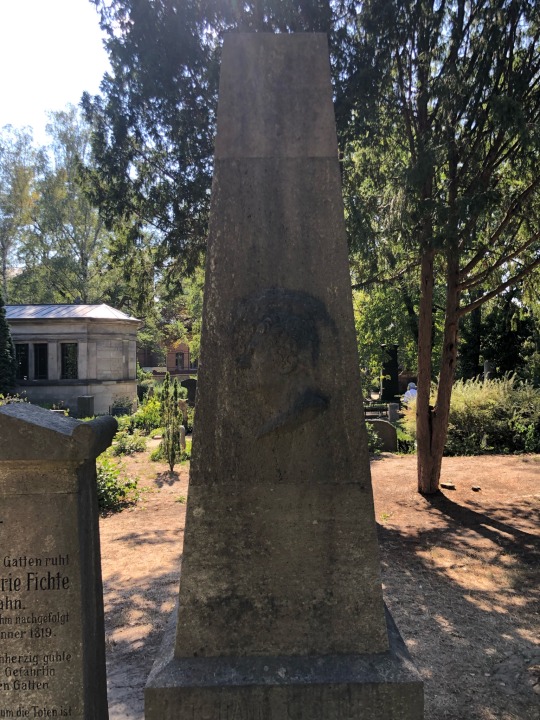
“Am I to eat and drink only to get hungry and thirsty and eat and drink again, until the grave opened at my feet devours me and I myself have sprouted to the ground as food? Have I fathered beings like myself so that they too might eat and drink and die and leave behind beings who will do the same as I have already done? What is the purpose of this circle of ever returning into itself, of this game of beginning anew in the same way, a game in which everything comes to be only to pass away, and passes away only to become what it already was? Why this monster that ceaselessly devours itself so that it can give birth to itself again and again, and gives birth to itself so that it can devour itself again?”
- J. G. Fichte, “The Vocation of Man”, 1799.
12 notes
·
View notes
Text
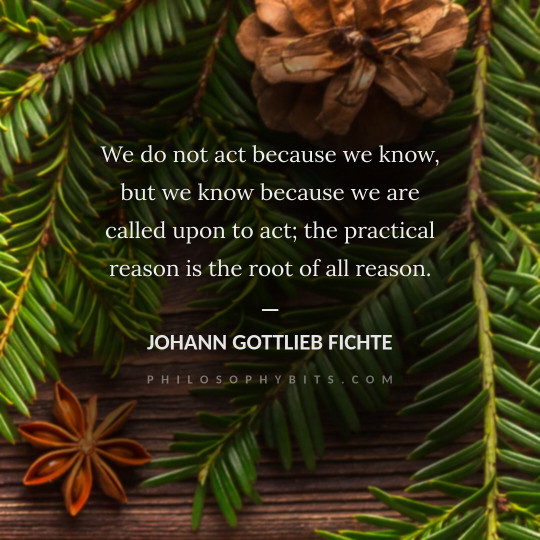
#philosophy#quotes#Johann Gottlieb Fichte#The Vocation of Man#Fichte#reason#rationality#actions#knowledge
5 notes
·
View notes
Photo
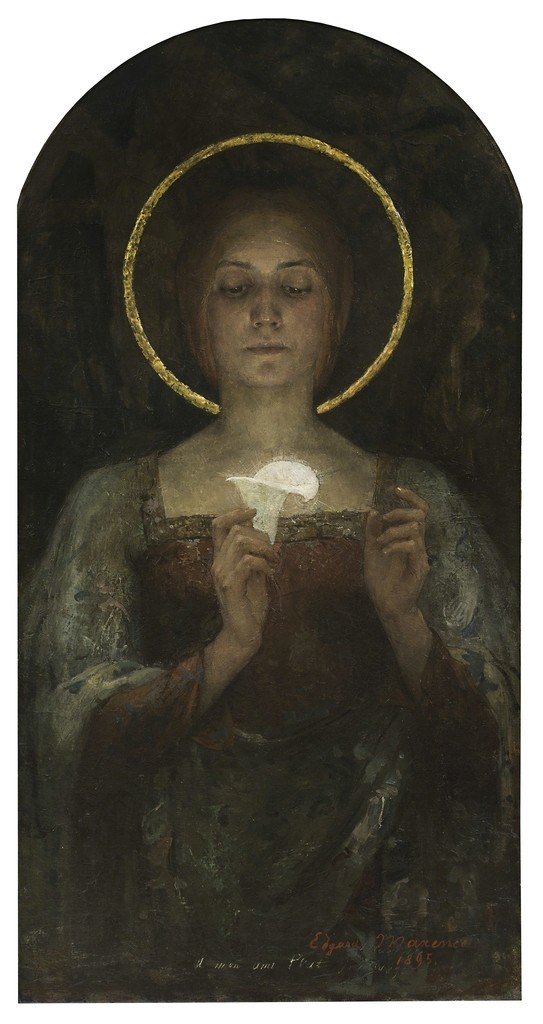
Pureté (Purity) or Saint with Calla Lily by Edgar Maxence (1895)
That which we call heaven does not lie beyond the grave; it is even here diffused around us, and its light arises in every pure heart. My will is mine, and it is the only thing that is wholly mine and entirely dependent on myself; and through it I have already become a citizen of the realm of freedom and of pure spiritual activity. What determination of my will—of the only thing by which I am raised from the dust into this region—is best adapted to its order, is proclaimed to me, at every moment, by my conscience, the bond that constantly unites me to this world;—and it depends solely on myself to give my activity the appointed direction.
—Fichte, The Vocation of Man
The sleep of initiation, which effects the transformation after long, preparatory purification of the astral-body—called catharsis—is quite different: the transmutation of copper (the passions) into gold (purity, eternity).
—Walter J. Stein, The Death of Merlin
See also The Twelve Senses, Forces & World Views
#Edgar Maxence#Christ in Taurus#Capricorn#Pisces#anthroposophy#spiritual science#Fichte#Johann Gottlieb Fichte#Christ in Aries
8 notes
·
View notes
Link
4 notes
·
View notes
Text
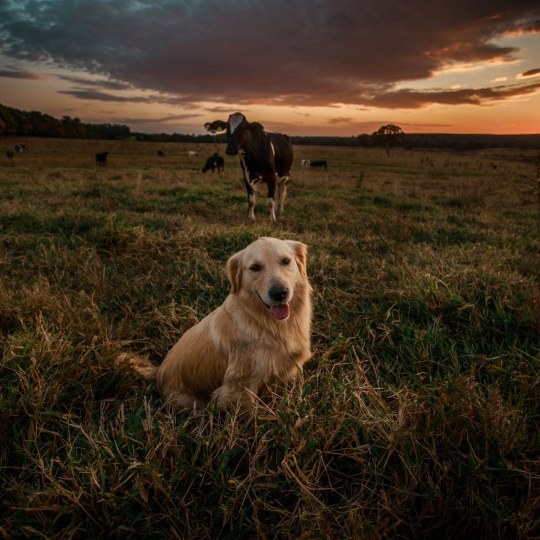
Hegel criticò l'infinito di Fichte che divenne una meta irraggiungibile e quello di Schelling perché, innanzitutto, Hegel aveva una visione della natura negativa (a differenza dei romantici) ed inoltre Schelling concepiva l'assoluto come identità indifferenziata di natura e spirito (non era capace di spiegare le differenze). Celebre divenne, difatti, la frase con la quale Hegel paragonó la filosofia di Schelling alla "notte in cui tutte le vacche sono nere" e che sancì la rottura tra i due.
Foto di Helena Lopes
#filosofia#storia della filosofia#filosofi#pillole di filosofia#Hegel#Shelling#Fichte#Critica#assoluto#Spirito#Momenti#Dialettica#Natura#Vacca#Mucca#Indifferenziato#Pexels#Foto#Fotografia
3 notes
·
View notes